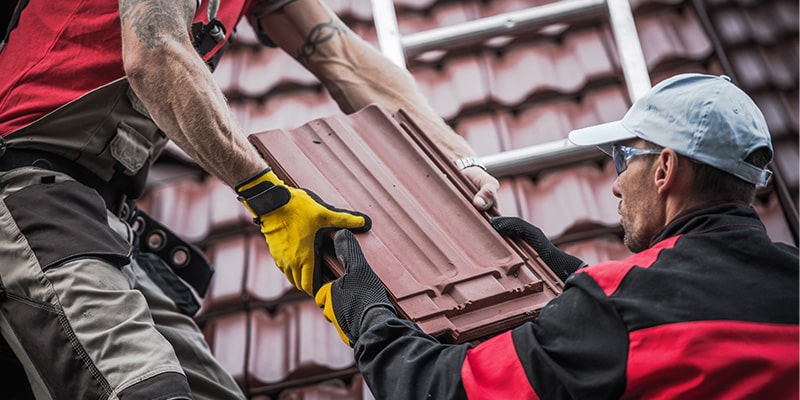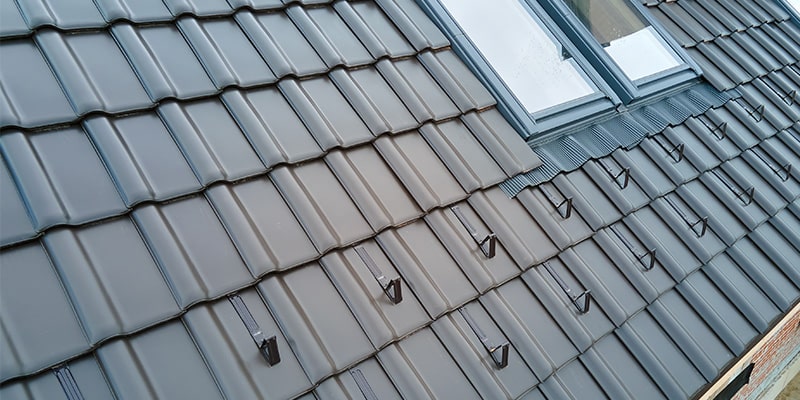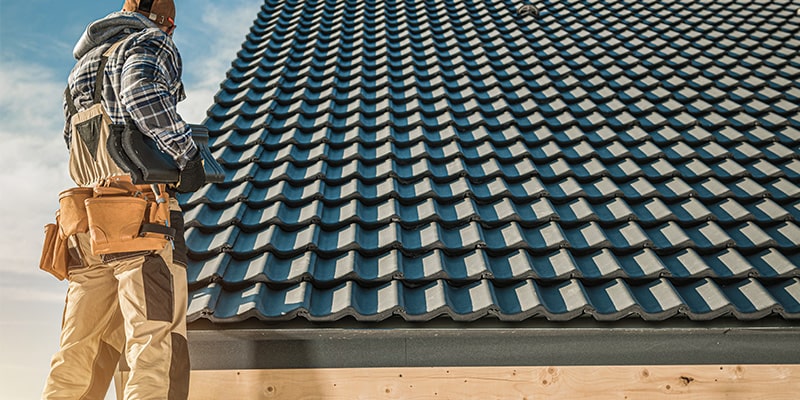Concrete Roof Tile Buying Guide

If you’ve had any experience in roofing, construction, or DIY, no matter how minimal, there’s a good chance you’ve come across concrete ties. Originally produced to compete with clay and slate, these hardy alternatives have become incredibly successful and popular in their own right, with a great many roofers lauding them as the tile of choice.
That being said, there is still a lot of confusion amongst homeowners (who may not be as familiar with the roofing trade) as to just what sets these tiles apart from the traditional options or, for that matter, even if they’re effective alternatives at all. This guide has been designed to answer some of the most common questions people have when shopping for concrete roofing tiles.
Below you’ll find some of the most important factors when it comes to concrete roofing tiles, from the core basics to some more advanced facts and figures. We’ll also give you some general tips when it comes to purchasing, installing, and keeping concrete roofing tiles, including their installation, maintenance, and more.
Contents
- What are Concrete Roof Tiles?
- Questions to Ask When Shopping for Concrete Roof Tiles
- Concrete Roof Tiles vs. Clay & Slate
- How Much Does It Cost to Tile My Roof?
- Concrete Roof Tile Installation
- Concrete Roof Tile Maintenance
What are Concrete Roof Tiles?
Concrete roof tiles are a variation of roofing tile that saw a dramatic increase in popularity throughout the twentieth century, though they have existed for much longer. As a cheaper, more easily sourced alternative to clay tiles, their durability and versatility helped them to become extremely popular, particularly in more urban new builds.
Today, they remain popular, serving as a fantastic mid-range tile for those who value visual appeal and endurance in equal measure. Recent developments in design and production techniques have also made them far more diverse in appearance and compatibility, meaning they suit a greater range of buildings now than ever before.
There are some notable and important statistics that should be considered when comparing concrete tiles to slate or clay alternatives, we’ll cover this in more detail below, but as a rule of thumb, concrete tiles are less expensive and about as visually versatile but have a shorter lifespan (particularly when compared to slate) and, perhaps most obviously, tend be heavier.
Questions to Ask When Shopping for Concrete Roof Tiles
What Style Do I Want for My Home?
Concrete roof tiles are some of the most diverse on the market, with a great many colours and styles to choose from. You need to be certain what sort of tiles you want for your home before scouring the market. Afterall, they will be difficult to remove and twice as expensive if you want to change them after the fact.
Some concrete tiles will be better suited to rural homes, while others will fit right in when applied in more urban conditions. Different brands, like Marley and Redland, offer different looks and designs too, so you may want to explore the different manufacturers on offer too before deciding on a product.
How Big Should My Tiles Be?
Concrete tiles are notable in that their sizes can vary more widely than clay and slate. Larger tiles have both pros and cons over smaller alternatives, but how these benefits and drawbacks affect you will ultimately depend on the size and structure of your roof.
Larger concrete tiles – despite their greater weight – tend to take less time to install, with less fixing to be done and larger spaces between overlapping tiles. However, your roof will have to be very sturdy and prepared to handle the added weight.
Smaller roofing tiles, on the other hand, will be far lighter, though the greater number of tiles that your roof will require may well result in it being under just as much stress as it would be when larger tiles are placed on it. Consider the age of your roof and the weight of the material it had on it before (if any at all) before making further decisions on the roofing material.

Can Concrete Tiles Be Easily Maintained?
Concrete tiles, like most roofing materials, require maintenance to keep them looking their best. While we will go into more detail further down in this guide, it is important to note that concrete tiles require much of the same maintenance that other tiles need, including a good clean every few years.
What Is My Roof Pitch?
Concrete roofing tiles require placement on a roof with a pitch of at least 15°. If your roof pitch is smaller than this, it is unlikely it will be able to support these tiles. Maximum pitches vary more widely, and so it is important that you check the individual product specification to ensure your chose tiles are compatible with your roof.
Concrete Roof Tiles vs Clay & Slate
There are several benefits to concrete tiles when compared to other roofing materials, other types of tiles included. Concrete tiles may be heavier, but this is only a result of their extraordinary resilience. In fact, few roofing materials are more durable than concrete roof tiles, with only metallic or synthetic roof tiles proving more resistant to shattering and cracking.
However, over time any and all tiles will eventually grow weaker and more prone to breaking. Not only are concrete tiles no different, but they also see a shorter lifespan than many examples of clay and slate tiles. Expected lifespans depend heavily on factors such as brand and style though, on average, you could expect 50 years out of concrete compared to clays and slates 100+ years (if properly maintained). You can find out more information about the longevity of concrete tiles in our how long do concrete roof tiles last guide.
Concrete roofing tiles are also very cost-effective, with a lower price point than the majority of their competition. This, in addition to the advances in production techniques allowing for a far greater variety of styles, has made concrete the perfect choice for new homeowners looking to put their own unique stamp on their house. For more information about the comparisions between concrete and clay then read our concrete vs clay guide.
How Much Does It Cost to Tile My Roof?
The cost of a concrete roof tile will ultimately depend on the manufacturer, though the size, thickness, colour, and style can all have an effect, as well as the quantity of tiles and whether or not it is supplied with accompanying fixings. However, overall, concrete roof tiles are cheaper than both clay and slate tiles. Around a few thousand pounds, depending on the size of your roof.
This is why concrete roofing tiles are often seen as the cheaper alternative to clay and slate tiles, a label which can have both positive and negative connotations. However, concrete roof tiles are more often than not fantastic value for the prices at which they are offered, thanks again in large part to an increased quality of appearance in recent years.
Concrete Roof Tile Installation
Concrete roof tile installation is very much similar to the installation of other roof tiles, but that does not mean it is in any way a simple task. In fact, roof tile installation is often considered one of the most difficult jobs in roofing, and certainly one of the most monotonous. This being the case, you may find it easier to bring in a professional.
Most modern tiles are installed via the ‘dry fix’ method, requiring fixings to attach the tiles to your roof. These fixings can sometimes be specialised (i.e. designed for use with a particular tile type) or can be produced to be more versatile, and suitable for use across a multitude of applications. The more traditional (though less used nowadays) ‘wet fix’ system involves securing tiles with mortar, which can be done with certain concrete tiles, though by no means all of them.
If you are unsure of how to go about installing your concrete tiles, it is first best to check with specific manufacturer instructions. If this fails to give you a clearer idea, we recommend consulting a roofer. As it is critical that your tiles – or indeed any roofing covering – are correctly installed to ensure that your home maintains a strong defence against rain, wind, snow and other extreme weather.

Concrete Roof Tile Maintenance
Concrete roof tiles can suffer from multiple issues including efflorescence, damp, cracking, and more. As such, it is important to keep on top of maintenance. Luckily, maintaining concrete roof tiles is no more difficult than looking after other tile types, and thanks to their durability, not something that has to be done regularly.
Numerous products exist to help you keep your tiles in good shape. Some are specialised cleaning products and solutions, while others include replacement fixings or even spare tiles for when your current pieces are beyond repair. At the end of the day, however, the biggest component is simple elbow grease.
Whilst both cold and hot pressure washing are options, they run the risk of lowering the lifespan of the tiles at best and causing a leak at worst. Simply scrapping away any moss and grim before finishing with a speciated treatment is the safest way to keep your concrete tiles in tip-top shape.
Concrete roof tiles do experience the aforementioned middle-ground lifespan, making them a solid all-rounder when it comes to maintenance. They’re also less fragile than other roofing materials when first added to your roof, meaning there is less chance of you accidentally breaking them when you go about cleaning them up.
Shop Concrete Roof Tiles
Whether you’re looking to replace damaged tiles or take the plunge and re-roof your home, our range of concrete roofing tiles and accessories is a great place to start. All stocked and supplied by leading tile manufacturers including Marley and Redland in a range of styles and finishes.
If you have any more questions about concrete tiles, please feel free to contact our award-winning customer team at 01295 565565 or via the handy live chat below. We’ll be happy to help answer any questions you may have on the subject, whether it be product installation, maintenance, or general advice on the products we have in stock.